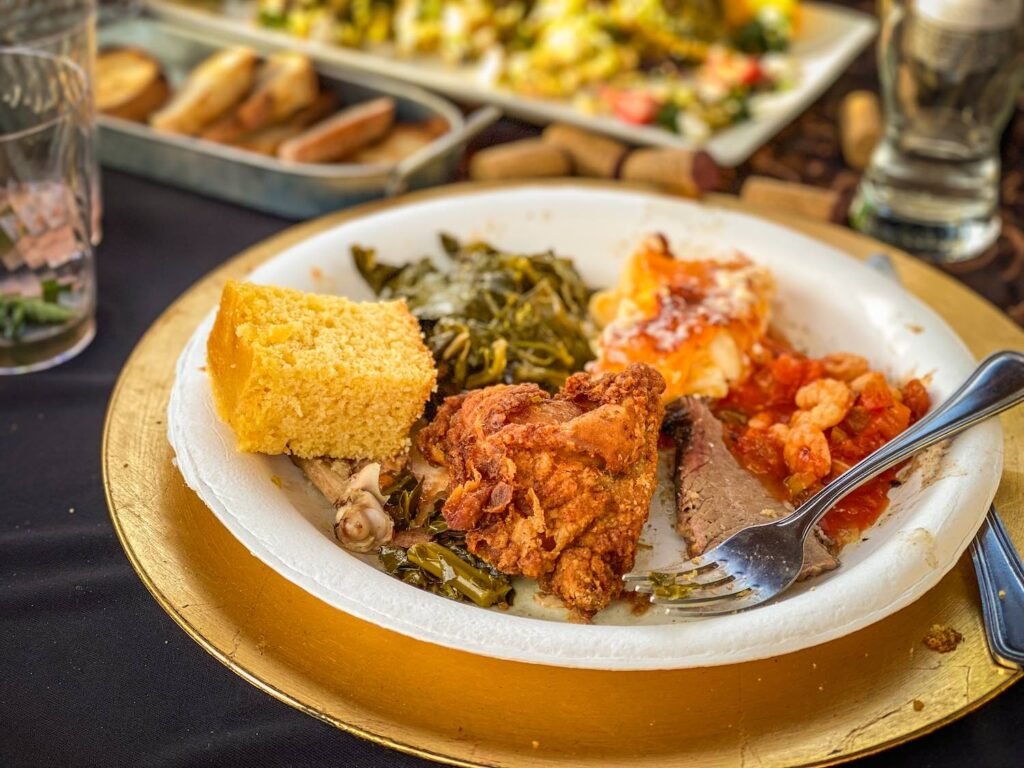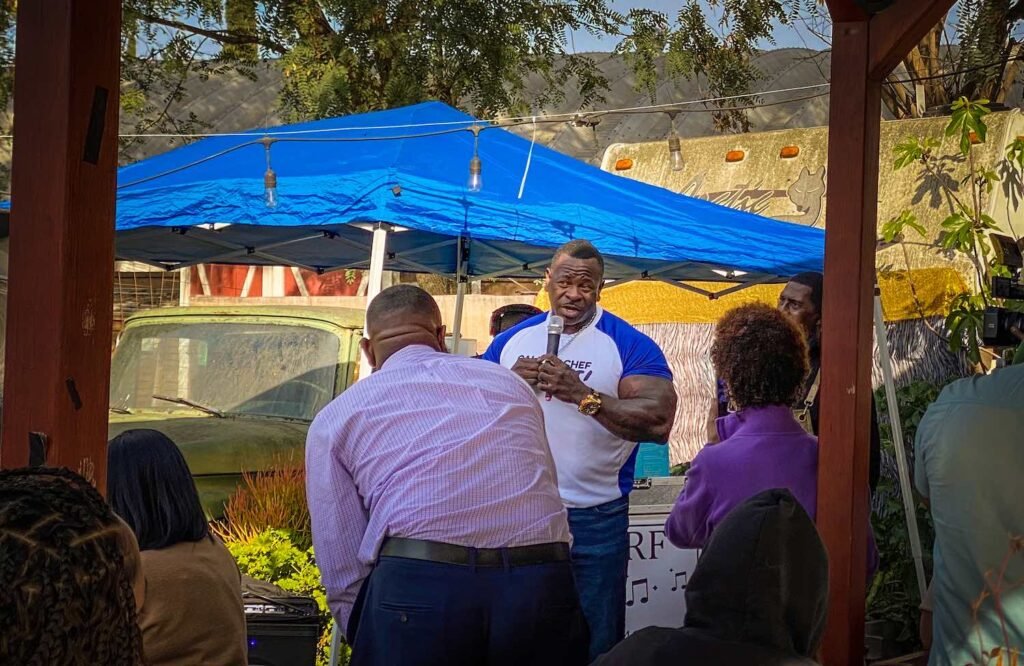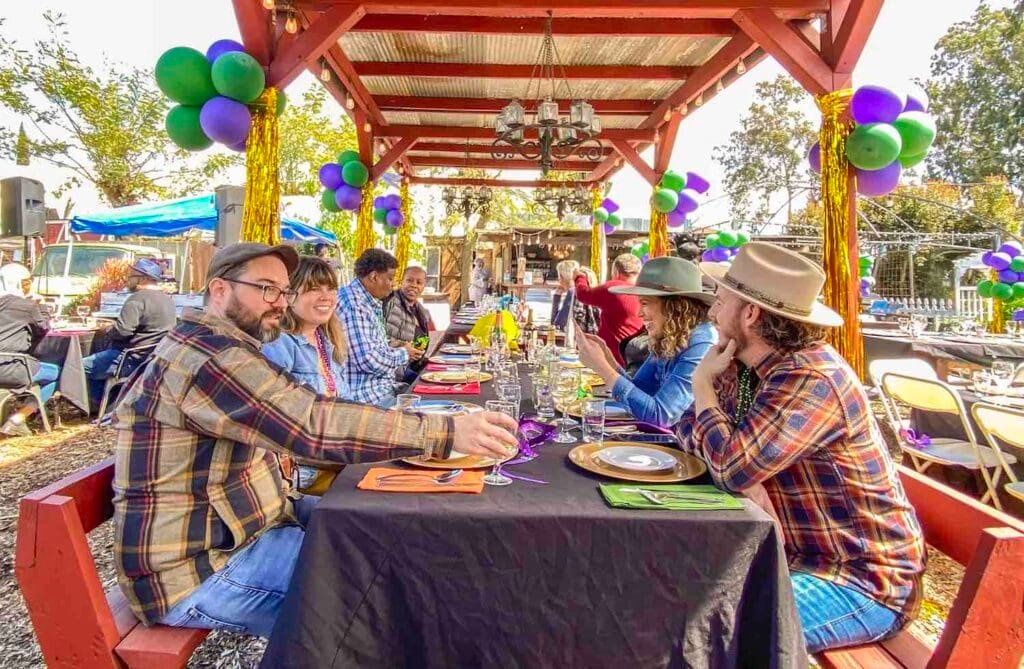Chef Rod Dodd, the man behind the tucked-under-a-freeway farm and garden space that is North Long Beach’s Organic Harvest Gardens, is returning with one of his most beloved and popular annual events: the Black History Month farm-to-table dinner, returning to the green space on Feb. 18.
“This is about celebrating and learning about where our food, as Americans, comes from in terms of the culinary arts—and that is through the African food diaspora,” Dodd said.

What the Black History Month dinner at Organic Harvest Gardens is
When it comes to the idea of American cuisine—a complex, diffuse, if not outright perplexing thing given our country’s history of genocide, enslavement, stealing land, and policing the world—there is one thing for certain: American cuisine, the food found during our developing days as a country and one that has influenced what we eat today, is Black food.
And this means the pillars of what we dub as soul food: from fried chicken and mac’n’cheese to greens and étouffée, these dishes—culled from America’s South, harnessed and perfected by Black Americans and slaves across hundreds of years—come to life at the annual Black History Month farm dinner.

“Slaves worked the White House kitchen, the kitchens of plantations, the kitchens of the powerful—Black folks dictated the American palate,” Dodd said. “That’s why each year, I bring Chef Andre Rush to the farm, to share his journey from rural Mississippi to the White House and beyond.”
The famed chef—whose book, Call Me Chef, Dammit, highlights both the beauty and struggles of Black chefs trying to make on an impact in the American culinary scene—has a gorgeously successful story, albeit tinged with a dark history: Rush was born and raised in rural Mississippi to find himself in the military proudly serving. That service, however, always reflected back his Blackness—and when it came to serve as the White House executive chef under multiple presidents, the impact of working as a paid, professional chef in a space in which many of his ancestors cooked as slaves is doubly impactful.

For those who have attended previous events, Rush’s annual speech is inspiring, powerful, and deeply moving.
“Chef Rush enjoys the African diaspora foodways that are presented during the celebration of Black History Month at the farm and the diversity of people that attend this gathering to pay homage to those African chefs and cooks who set the standards for American cuisine as we know it today,” Dodd said, noting that the event sees a hearty collective of Black folk but also white, Latino, Asian, and mixed families coming together to honor Black food and Black history.
Why celebrating Black contributions to food is essential in Long Beach and beyond
When writing about the systematic divvying up Long Beach’s Black historic core—largely defined geographically as north of 10th Street and south of Willow Street, east of Long Beach Boulevard and west of Walnut Avenue—that almost remained permanent during the redistricting process of 2021, it was clear to me, as a white resident, the way in which we have whittled down Black presence and culture in Long Beach.
And it is why events such as these are so important.
As the Black population within Long Beach, which saw a 13% loss from 2018 to 2019 alone, continues to face dwindling numbers—with reasoning ranging from unaffordable housing to a lack of social connectivity—the need for Black cohesion and preservation is paramount for residents, both Black and non-Black. Take the words of Long Beach resident Sheba Gillis back in 2021 during the redistricting process:
“There is no statistical possibility that the Black community can even become, numbers-wise, the most powerful group. The [Black historic core] is heavily Latino now—but there is no reason we can’t come together, as Latinos, Blacks, and Cambodians, to help maintain our core. We might not be many but we have history here, history that we have watched disappear decade after decade.”
And this is what Chef Dodd’s culinary endeavor embraces: that Black culture in Long Beach is worth not only upholding but celebrating and that food can help us better understand one another in a time where increased sensitivity and knowledge of systemic marginalization is clutch to moving forward as an eclectic society.



The importance of the return of Organic Harvest Garden’s Black History Month farm dinner in Long Beach • Longbeachize
afvtzjyfgfk
[url=http://www.gk53lqb99x3ri3vo91077dl62txr05r8s.org/]ufvtzjyfgfk[/url]
fvtzjyfgfk http://www.gk53lqb99x3ri3vo91077dl62txr05r8s.org/